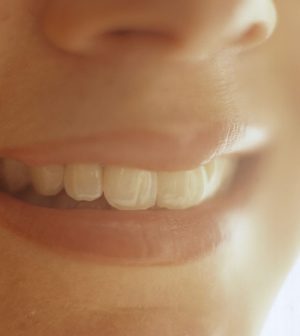- Could Your Grocery Store Meat Be Causing Recurring UTIs?
- Are You Making This Expensive Thermostat Error This Winter?
- Recognizing the Signs of Hypothyroidism
- 10 Strategies to Overcome Insomnia
- Could Artificial Sweeteners Be Aging the Brain Faster?
- Techniques for Soothing Your Nervous System
- Does the Water in Your House Smell Funny? Here’s Why
- Can a Daily Dose of Apple Cider Vinegar Actually Aid Weight Loss?
- 6 Health Beverages That Can Actually Spike Your Blood Sugar
- Treatment Options for Social Anxiety Disorder
Do Your Pearly Whites Sometimes Cause You Pain?

Do you feel a sharp pain when you eat or drink something cold or hot? You may have sensitive teeth, a common problem caused by a number of factors.
Gum recession is the most common cause. When the gum starts to recede, the tooth’s root becomes exposed, resulting in sensitivity, explained Jane Cotter, assistant professor at the Texas A&M College of Dentistry.
Other causes include toothbrush abrasion, tooth decay or faulty restorations, treatment for gum disease, excessive grinding or excessive bleaching.
“What you eat and drink can also cause your teeth to become more sensitive,” Cotter said in a school news release. “Sodas — both diet and regular — energy drinks, fruit juice, wine and coffee can all worsen your teeth sensitivity. Acidic foods, such as citrus fruits, are also active in this sense, but less than with liquids.”
There are a number of ways to deal with sensitive teeth.
“There are several over-the-counter toothpastes that have potassium nitrate or calcium phosphate that can help with sensitivity when used daily,” Cotter said. “The use of fluoride gels and rinses are also helpful for sensitivity. Be sure you’re using a soft-bristle toothbrush or mechanical toothbrush to help control the pressure when brushing.”
If none of those approaches work, talk with your dentist, she advised. Before doing so, make a record of tooth sensitivity details such as duration, type of pain, triggers and location.
“Tooth sensitivity is an indication of a change in the tooth or supporting tissue,” Cotter said. “Whether it’s tooth decay, infection or dentin hypersensitivity, it should be addressed.”
More information
The American Dental Association has more on dental health.
Source: HealthDay
Copyright © 2026 HealthDay. All rights reserved.










